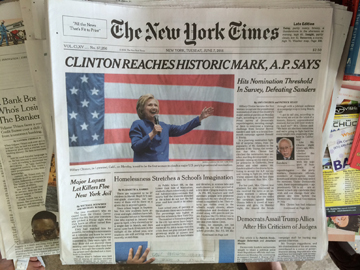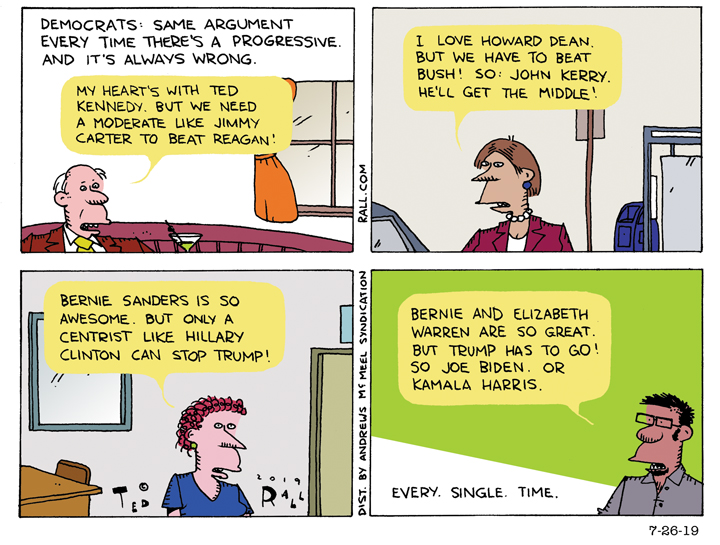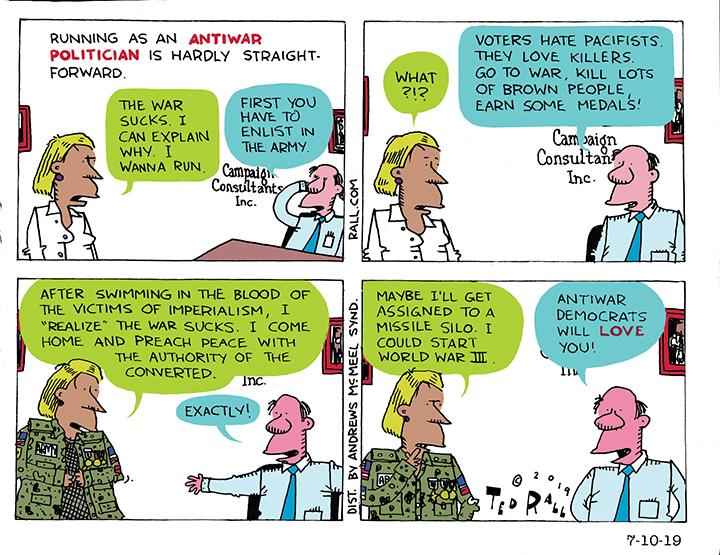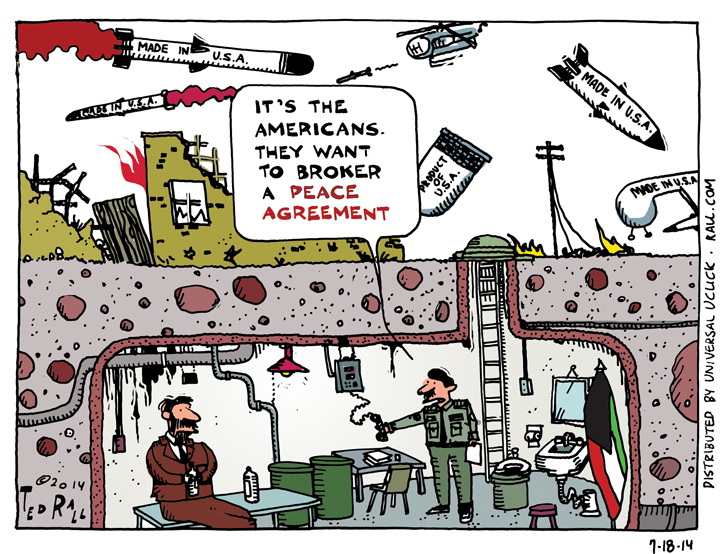It’s the oldest debate within the Democratic Party: what to do about a progressive insurgent candidate? Whether it’s Ted Kennedy’s challenge against Jimmy Carter in 1980, Howard Dean against John Kerry in 2004 or Bernie Sanders against Hillary Clinton, moderates and centrists always say the same thing: in order to win, you need those swing voters. That means you have to pick the moderate choice. The problem with that argument is that it never really works out in the general election. Kennedy and Dean’s voters stayed home in November. 3 to 4,000,000 Bernie Sanders primary voters never showed up for Hillary Clinton. Now the same argument is being floated again, this time in favor of Joe Biden.
SYNDICATED COLUMN: How the Media Manipulated the Democratic Primary
 Though it might not always seem like it, the news media is composed of human beings. Humans aren’t, can’t be, and possibly shouldn’t be, objective. Still, there’s a reasonable expectation among consumers of political news that journalists of all political stripes strive to be as objective as possible.
Though it might not always seem like it, the news media is composed of human beings. Humans aren’t, can’t be, and possibly shouldn’t be, objective. Still, there’s a reasonable expectation among consumers of political news that journalists of all political stripes strive to be as objective as possible.
At their minimum, media outlets ought to be straightforward about their biases.
They certainly shouldn’t have, or appear to have, their thumbs on the scales.
Unfortunately, all too often, it appears that the political system is rigged – and that the major media companies play an important role in gaming the system. That’s what has happened throughout this year’s Democratic primaries, in which the vast majority of corporate media outlets appear to have been in the bag for Hillary Clinton, the establishment candidate, against self-described “democratic socialist” insurgent Bernie Sanders.
Examinations of coverage have confirmed the impressions of cable news junkies that Sanders has been the victim of a blackout, thus depriving him of a chance to make his case to voters. When the chairwoman of the Democratic Party, Debbie Wasserman Schultz, scheduled the first round of Democratic debates at times the party hoped nobody would be watching – again, a seemingly obvious ploy to deprive Sanders of exposure – corporate media outlets had little to say about it.
Then there has been the media’s complicity in spreading Clinton campaign talking points that bore little relation to the truth.
MSNBC and other DNC-aligned media outlets kept pointing out that Clinton won 3 million more votes than Sanders. True, technically. But that’s pretending that caucus states didn’t exist. Sanders did better than Clinton in caucuses.
Most recently, they conflated pledged delegates – those won by a candidate based on votes cast – with superdelegates, the Democratic politicians and party officials who will be able to vote however they want at the convention this coming July. Back in November, an Associated Press survey found that Hillary Clinton – unsurprisingly – enjoyed the support of the vast majority of the superdelegates. Assuming that the superdelegates will not change their minds, the AP called the Democratic race for Hillary Clinton on Monday, the night before a set of important primaries, including California. Does anyone doubt that calling a race over as the effect of depressing voter turnout?
It’s impossible to quantify that effect, to know how many people didn’t bother to show up at the polls because they were told it was all over. In California, however, Hillary Clinton won 56% of the vote in a state where polls showed the two candidates neck and neck. (California’s state election officials also did their best to keep voters away from the polls.)
As a journalist, I’m reluctant to categorically argue that the AP ought to have held its statistical analysis of the race until after Tuesday’s vote. News ought not to be suppressed. When you have it, you ought to report it. Similarly, I’m not sure that the New York Times was wrong to report the AP story. However, I do question the editorial wisdom of running it as a banner headline. The United States is a democracy. We elect our leaders based on votes actually cast by real people, not polls. Even after Tuesday’s vote, Hillary Clinton still didn’t have enough pledged delegates to claim the Democratic nomination. Since those superdelegates aren’t going to vote until July, she won’t be able to really claim the nomination until then.
Agreed, it’s a silly system. But it’s the system the Democrats have. They – and the media – ought to abide by it. Besides which, think how embarrassing it will be if the Justice Department indicts Hillary between now and July. There’s a lot to be said for leaving things hanging.
The thing that disgusts me most about this system – besides the perpetual state of war, the manufacturing of mass poverty, the prison industrial complex, the miserable state of the justice system, the fact that it’s impossible to make a decent living working 40 hours a week – is that it doesn’t even pretend to follow its own rules in a consistent way. Consider, for example, how the New York Times couldn’t wait to report its “Hillary Clinton becomes first woman nominee from a major political party” story until after the primaries in California et al. Would one or two days have made a big difference? (Well, yes. Sanders might have won California.) If the idea is to get the story out first, no matter what, even if it suppresses the vote, I can respect that. But then they ought to be consistent.
It was a very different story back in 2004. A few weeks before the general election in November, the New York Times researched and came to the conclusion that George W. Bush, the incumbent, may have cheated in at least one of the presidential debates against Sen. John Kerry. Photographs of the debate clearly showed a suspicious bulge in Bush’s shoulder; the Times did report the story as a light he-says-she-says piece. But then experts concluded that the tongue twisted former governor of Texas had been using a receiver paired with an earphone in order to get advice and retorts to carry from an unknown co-conspirator.
Editors at the paper decided to hold a serious exposé until after the election so that its coverage would not affect the results. Then they killed it. Four more years of Bush followed.
Actually, the corporate media’s policy is brutally consistent. If holding a story benefits the forces of reactionary conservatism, it gets held. If releasing it does so, it gets released. Time after time, the system exposes itself for what it is.
(Ted Rall is the author of “Bernie,” a biography written with the cooperation of Democratic presidential candidate Bernie Sanders. His next book, the graphic biography “Trump,” comes out July 19th and is now available for pre-order.)
SYNDICATED COLUMN: Clueless in Gaza – We Americans Support Democracy, But Only When the Elections Go Our Way

“Rarely has a president been confronted with so many seemingly disparate foreign policy crises all at once,” The New York Times noted about Obama on July 23rd. What the paper didn’t/won’t/can’t say is: Rarely has a president caused so many of his own crises.
This summer, most of Obama’s problems follow from his unwillingness to respect democracy overseas.
The U.S. government supports democracy in other countries — but only if the elections go its way. If not, anything goes to obtain a favorable outcome: economic sabotage, backing violent coups d’état, installing dictators to replace democratically-elected leaders, even ginning up all-out war.
Three recent examples showcasing U.S. contempt for electoral democracy include Egypt, and two places making news this week, Palestine and Ukraine.
Egypt’s 2012 election, the first after the overthrow of U.S.-backed autocrat Hosni Mubarak, is a recent case of American perfidy that’s embarrassing going on tacky. Mohamed Morsi of the long-banned Muslim Brotherhood, an Islamist party, won the presidency in elections international observers called as fair and transparent as could be expected in a nascent democracy.
The thing to do, of course would have been to congratulate Morsi, the Brotherhood and the Egyptian people, and offer assistance upon request.
Rather than accept the results, however, the Obama Administration “channeled funding … [that] … vigorously supported activists and politicians who have fomented unrest in Egypt.” A year later, Morsi was overthrown by a coup that restored Mubarak’s military junta minus the ailing former tyrant. Ignoring American law, Obama continues to finance General Abdel Fata al-Sisi’s violent, oppressive regime, which many human rights groups describe as even more brutal than Mubarak’s. Morsi, a democratically-elected leader whom a principled American president should demand to be restored to power, rots in a prison whose jailers are paid by American taxpayers.
To add Orwellian insult to neocolonialist injury, Secretary of State John Kerry is still saying that Egypt’s post-Morsi junta is “transitioning to a democracy.” Kerry’s mouthfart came a day after al-Sisi sent three foreign journalists away for long prison terms.
Overshadowed by Israel’s latest brutal swat-a-fly-with-laser-guided-missiles invasion and bombing campaign against the Gaza Strip is the fact that, as in Egypt, the United States got the elections it demanded in Palestine, only to succumb to buyer’s remorse after the ballots were counted.
The Palestinian elections of 2006 are hardly the most thrilling story ever told, so I won’t be surprised if you decide to look at this story about the guy who sent his wife a spreadsheet detailing all the excuses she gave him for not having sex and never look back.
Still here? Here’s an abridged recounting of an episode that not only sheds some light on the current conflagration between Israel and Palestine, but reveals the methods used by Israel and its allies to undermine Palestinian self-governance — and belies America’s loudly proclaimed commitment to democracy to boot.
Israeli leaders like to complain that the Palestinian side doesn’t offer them a viable partner with whom to negotiate peace. Read the following, however, and Israel’s right-wing government’s real agenda becomes clear: to demoralize and divide the Palestinian people in order to sap their resistance to economic and military oppression.
In the Palestinian legislative elections of 2006, held both in the West Bank and Gaza in response to pressure from the United States, Hamas beat Fatah (Yasir Arafat’s more moderate party), 44.45% to 41.43%, entitling it to 74 seats in parliament over Fatah’s 45. (The current split, in which Hamas rules Gaza and Fatah has the West Bank, followed a later internal military clash.)
Israel’s interference with the 2006 elections began during campaign season, when it preemptively arrested and jailed 450 members of Hamas because they were involved in the elections as candidates or campaign workers. Despite this and other acts of sabotage, including trying to ban residents of East Jerusalem from voting, the elections went off well. The European Parliament’s spokesperson called the vote “extremely professional, in line with international standards, free, transparent and without violence.”
The thing to do would have been to congratulate Hamas and the Palestinians, and offer assistance upon request.
Instead, the Bush Administration and its allies cut off aid to the Palestinian Authority, ended diplomatic relations and imposed trade and other economic sanctions. Three months after Hamas formed its first government, in June 2006, Israel invaded Gaza and the West Bank, demolished and bombed civilian and government infrastructure, and arrested 25% of the members of parliament “because technically they were members of a terrorist organization although they may not be involved in terrorist acts themselves.” The U.S., which supplied the weapons used in the attacks, cited Israel’s “right to defend itself.”
Hamas, U.S. government-controlled media frequently reminds readers and viewers, is a U.S.-designated terrorist organization. So to people who don’t hold tickets to the Way Back A Decade Ago Machine, the actions of America, Israel and their allies vis-à-vis Hamas, which rules Gaza, seem reasonable. They’re terrorists! They shoot rockets at Israel! (Really lame rockets, but still.)
Hamas remains boxed in and desperate under Obama. Israel and Egypt’s al-Sisi regime, the two largest recipients of U.S. foreign aid military hardware, have shut the territory’s land crossings to Israel and Egypt and imposed a naval blockade on the Mediterranean coastline. Despite dozens of tunnels built to smuggle in goods, the West’s sanctions regime has been successful; Gaza’s economy has tanked, and unemployment among its 1.8 million people has risen to 38.5%. (The highest rate in the U.S. during the Great Depression of the 1930s was 25%.) Shooting rockets at civilians isn’t a great way to make friends — but desperation makes people do stupid things.
What the U.S. media doesn’t want you to know is: Hamas is popular. They won the last election, and they’d probably win again if one were held now. By pushing regime change in Gaza, therefore, the U.S. wants to replace a popular government with an unpopular one…in other words, subverting democracy.
Ukraine is yet another case of a democratically-elected ruler overthrown by a U.S.-backed coup.
Viktor Yanukovych won the Ukrainian presidency in 2010 elections that were widely believed to have conformed to international standards according to foreign observers. The thing to do would have been to congratulate him and the Ukrainian people on a fair election, and offer assistance upon request. But the U.S. was wary of Yanukovych, worried he might not easily be tamed. (Sample American punditry at the time: “The Ukrainians need to expand their relationship with the International Monetary Fund.”)
He didn’t. Finally, in November 2013, Yanukovych sealed his fate by siding with neighboring Russia over a pending EU association agreement — thus rejecting closer ties to the West and the United States. Street protests that led to Yanukovych’s ouster in February 2014 were likely indigenous, but would almost certainly not have succeeded in driving the president into exile without the flow of hundreds of millions of dollars in covert U.S. funding to the Maidan organizers.
Though more of a money-motivated oligarch than a creature of the far right, current Ukrainian president Petro Poroshenko has repeatedly demonstrated his willingness to accommodate right-wing factions, including neo-fascists, in Ukraine. Moreover, whatever you think of Poroshenko, he is not the legitimate ruler of the country. Nevertheless, President Obama has recognized him as such and offered economic and military hardware in his civil war against Russian-speaking separatists in the eastern part of the country.
I’ll close with a quote from Noam Chomsky: “For Washington, a consistent element is that democracy and the rule of law are acceptable if and only if they serve official strategic and economic objectives. But American public attitudes on Iraq and Israel/Palestine run counter to government policy, according to polls. Therefore the question presents itself whether a genuine democracy promotion might best begin within the United States.”
(Ted Rall, syndicated writer and cartoonist, is the author of “After We Kill You, We Will Welcome You Back As Honored Guests: Unembedded in Afghanistan,” out Sept. 2. Subscribe to Ted Rall at Beacon.)
COPYRIGHT 2014 TED RALL, DISTRIBUTED BY CREATORS.COM
War and Peace, Made in USA
As the largest, most expansionary military empire in history and the world’s number one arms supplier, often to both sides in conflicts, the United States is once again offering, hilariously, to broker a peace agreement, this time between Hamas in Gaza, and Israel. First you start the war, or at least expand it, then you get credit for making peace!
SYNDICATED COLUMN: If You Can Get Fired Over Your Politics, What Good is the First Amendment?

Now that the controversy over Mozilla’s firing of CEO Brendan Eich over his antigay politics has subsided (and before something similar happens again, which it surely will), it’s time for a brief tutorial on McCarthyism.
Because, if those who forget history are doomed to repeat it, Americans — who don’t notice history even as it’s happening, while it’s making headlines — are condemned to the endless purgatory of idiocracy.
McCarthyism, also known as the 20th century’s second Red Scare, took on several forms in the 1950s. Today, however, let’s focus on blackballing.
Blackballing, also often known as blacklisting (there are so many a.k.a.’s), is the act of denying employment to someone due to political opinions they express, and activities in which they participate, away from the workplace.
The qualifier “away from the workplace” is important. Denying you a paycheck because of your politics — politics you don’t express at work — is the essence of blackballing, and arguably the most powerful torture device in the censor’s toolbox. Examples of blackballing include the disgusting Hollywood blacklist of left-leaning actresses like Marsha Hunt and director Charlie Chaplin, and the 2004 firing of an Alabama woman because she had a John Kerry bumpersticker on her car. Also in 2004, Men’s Health magazine dropped my comic strip — which was about sex and relationships, 100% apolitical — because I opposed George W. Bush and his invasions of Afghanistan and Iraq.
As Timothy Noah wrote about the bumpersticker firing: “Firing a person because you don’t like his or her politics runs contrary to just about everything this country stands for, but it is not against the law.” The U.S. embraces the savage fiscal Darwinism of “at-will employment,” which allows employers to hire and fire workers as they please, unless a victim can prove — which is difficult — discrimination due to race, color, religion, gender, age or disability.
Incredibly, your boss can fire you simply for being a Democrat or Republican.
Blackballing squelches expression and debate. Yet the American public doesn’t seem to mind that the First Amendment doesn’t protect them where they spend more than half of their waking hours — at work. Which set the stage for what happened to Brendan Eich.
Star LGBT columnist-editor-author Dan Savage “shrugged off” suggestions that Mozilla blackballed Eich: “No gay rights organizations had called for him to step down. This wasn’t really an issue in the gay community, it was an issue at Mozilla. There were people at Mozilla who didn’t want this man representing them.”
(Disclosure: Savage has commissioned work from me, and I have said nice things about him, which I meant.)
Savage is right. No gay rights groups weighed in. They kept quiet. None spoke out in Eich’s defense.
Hey, if someone offs this turbulent priest, it’s no skin off my ass.
“He was perceived by his own employees as an unacceptable CEO,” Savage remarked, pointing to Eich’s record of right-wing politics, which included supporting Pat Buchanan and Rand Paul, in addition to the $1000 campaign contribution to California’s Proposition 8 in 2012, which attempted to ban gay marriage in the state.
Exactly so.
Eich was perceived as “an unacceptable CEO” by Mozilla. But this was not because of his computer skills, which are widely seen as unimpeachable, or his management talent, which only came under fire after his politics came to light.
The New Yorker’s James Surowiecki showcased the rationale of McCarthyism. Allowing that Eich is “a brilliant software engineer who had been the company’s chief technology officer,” Surowiecki explained: “The problem was that Eich’s stance was unacceptable in Silicon Valley, a region of the business world where social liberalism is close to a universal ideology.” To which one might ask: so what? If I only bought products made by companies whose CEOs I liked, my house would be empty.
And here, the “well, duh” logic that ignores the much bigger question of whether censorship is a good idea: “In interviews, [Eich] repeatedly spoke about the need to respect the diverse views of Mozilla community members…But there was something self-evidently odd about the pairing of Eich’s rhetorical support for diversity with his financial support for denying legal rights to gay people.”
Bear in mind: Eich pledged, in writing, not to discriminate against gay Mozilla employees. There’s no evidence that he ever mistreated any member of the LGBT community.
What is “self-evidently odd” about the argument that a company that values diversity ought to be able to make peace with a right-wing, anti-gay marriage CEO? Nothing. These “liberals” are blind to their own prejudice. In the same way that cable news channels believe that ideological diversity runs the gamut from center-right Clinton Democrat to right-wing Republican, Surowiecki and Mozilla’s top executives think acceptable political discourse allows for no disagreement on gay marriage.
This makes me nervous, and not just because I’m a political pundit or because gay marriage is an issue about which Americans have changed their minds at a breathtakingly rapid rate. If anything you say can be used against you in the court of the HR office, who is going to risk saying what they think? At Mozilla, Republicans would be wise to stay in the political closet. Isn’t that kind of…fascist?
Which is why I have consistently refused to join, actively opposed and publicly argued against boycott campaigns against right-wingers like Dr. Laura and Rush Limbaugh.
I think Eich is wrong about gay marriage. I disagree with his right-wing views. He’s a rich (former) CEO, so I don’t care about him personally. Nevertheless, Eich has become a symbol of something dangerous and wrong.
If you can lose your job due to your politics — especially if those in charge find those politics repugnant — there are only two options available to those of us who need to earn a living: keep our opinions to ourselves, or lie about them. If politics leaves the public sphere, forced underground by watchful employers and politically correct coworkers and anonymous online crusaders, how does the United States differ from East Germany?
(Support independent journalism and political commentary. Subscribe to Ted Rall at Beacon.)
COPYRIGHT 2014 TED RALL, DISTRIBUTED BY CREATORS.COM
SYNDICATED COLUMN: What Would President Hillary Do? She’ll Be the First Woman President.

Hillary is the talk of 2016. Will she run? According to the pundit class whose water cooler speculation gets repackaged as “conventional wisdom,” the nomination is the former First Lady’s for the asking. Following a coronation that saves her cash and bruising primary battles, it’s currently hard to conjure a Republican who can stop her from taking the general election too.
But to paraphrase a recent viral music video, there’s one thing that no one knows:
What would President Clinton II do?
I posed this question to “Ready for Hillary,” the main pro-Hillary Super PAC. “Ready for Hillary focuses on grassroots organizing, not policy,” replied Seth Bringman. “Policy decisions would be up to the campaign if Hillary runs, which we are certainly encouraging her to do. We amplify the causes Hillary is advocating for and spread the word to our more than one-and-a-half million supporters. We have done so when Hillary spoke out on immigration reform, health care, voting rights, unemployment insurance, and the government shutdown.”
Given that the pre-primary season doesn’t begin for another 18 months, it’s a little early to expect a fully fleshed-out policy platform from a probable candidate. But HRC isn’t a fresh young thing. She’s been kicking around politics for decades — so it’s more than a little strange that neither her fans nor her enemies has a clue what she’d do about a host of issues.
Long before 2000, Al Gore’s longstanding interest in climate change signaled that the environment would have been a priority in his administration. Beginning with his testimony in the 1971 Winter Soldier hearings, John Kerry’s career path predicted a preference for diplomacy over war. On the other hand, it was similarly clear long before 2008 that a John McCain Administration would have been belligerent and quirky, featuring occasional alliances of convenience with Democrats.
So, what about Hill? The only agenda item anyone could have reasonably predicted was a revival of HillaryCare — which is now basically Obamacare. The biggest arrow in her quiver is gone.
Ready for Hillary says it has raised $4 million from 33,000 donors during 2013. That’s a lot of money. You’d think the donors would know what they’re buying, but if that’s the case, they’re keeping it to themselves.
Hillary leads every poll of the Democratic field for 2016. But why? What is it about her that makes some liberal voters swoon?
I combed the Internet looking for signs of something approximating a political agenda. I pushed out the following question to social networks: “Support Hillary for 2016? Can you tell me what she would DO?”
The closest approximation to an answer came back: “She would be the first woman president.”
Yeah, we knew that — but would she be a first woman president who fires drones at wedding parties, or a first woman president who pushes for a $20/hour minimum wage, or a first woman president who continues the first black president’s policy of not using government to try to create jobs? Would she be a first woman president who closes Guantánamo? Would she be a first woman president who continued NSA spying on Americans? Would she be a first woman president who adds a public option to the Affordable Care Act?
As far as I can tell, the (Democratic) arguments for Hillary boil down to the following talking points:
- Unlike Obama, who let himself get rolled by the Republicans, Hillary is tough and battle-tested. She’s a good negotiator.
- She’s an experienced manager. “Ready on day one,” she argued in 2008. She knows everyone and everything in government.
- Like her husband, she’s somewhat more liberal than Obama.
- She’s pre-disastered, thus electable. If there were any more Travelgates, Whitewaters, etc., the media would have uncovered them by now.
These are personality traits, not prescriptions for America.
Hillary Clinton isn’t a candidate — she’s a brand. She doesn’t offer a set of ideas; she projects a vague sense of competence that feels absent in the current White House. (Didn’t she used to hold some kind of big job in that place?) Despite having held high posts in government, she can’t point to a single major legislative or ideological achievement — but that doesn’t matter to her supporters.
Mostly, Hillary represents the potentiality of a historical symbol: first woman president. As soon as she takes the oath of office, her campaign’s biggest goal, shattering the ultimate political glass ceiling, will have been achieved.
If this feels familiar, it should. Senator Barack Obama was Clinton in 2006 and 2007, projecting calm after long post-9/11 years of jittery Bushisms, with a light resume that served as a blank slate, allowing people to project their hopes and ideals upon him. In the end, all that mattered was the beginning: winning as a black man. For the Obamabots, all that followed — protecting Bush’s torturers, the bankster bailouts, the drones, the NSA — was beside the point of their politics of identitarian symbolism.
What will happen to the long-term unemployed under Hillary? If 2008 serves as a guide, the 2016 campaign will pass without Americans much talking or thinking about such questions.
(Support independent journalism and political commentary. Subscribe to Ted Rall at Beacon.)
COPYRIGHT 2014 TED RALL, DISTRIBUTED BY CREATORS.COM
SYNDICATED COLUMN: 54% of the Time, Americans Aren’t Protected by the First Amendment

Of Hicks, Duck Dynasty and Free Speech
“Don’t talk about politics or religion.” It’s boilerplate advice, especially this time of year when family members and friends with varying cultural outlooks gather to break (if you’re a California liberal, gluten-free) bread.
Keeping your opinions to yourself is smart if your priority is conflict avoidance. But keeping the peace makes for seriously boring holiday meals.
Aside from the tense tedium of forced blandness, all that self-censorship accomplishes is to paper over conflicts and differences everyone knows or suspects are there anyway. Nothing gets resolved.
To the contrary, self-censorship enables bad ideas. Unchallenged year after year, the stupid people at the table return to their stupid homes as confident as ever in their stupid opinions, no matter how indefensible.
We are seeing the no-politics dictum play itself out with increasing frequency on a national level, with dismaying implications for freedom of expression.
This week we’re talking about “Duck Dynasty,” a reality TV show I haven’t watched. Phil Robertson, the ZZ Top-bearded patriarch of a Louisiana clan who struck it rich with a gadget that calls ducks, is the show’s star. He’s also a hick. Like many other hicks, Robertson holds stupid opinions about gays and blacks, which he expressed in media interviews.
After people complained about Robertson’s stupid thoughts, A&E “suspended” Robertson. He may or may not come back to the show.
Right-wingers, including ferret-faced Louisiana Governor Bobby Jindal and intellectual beacon Sarah Palin, played to their bigoted Republican base, issuing strident electronic missives decrying Robertson’s maybe-firing on the grounds of free speech. MSNBC and other Democratic Party mouthpieces responded in kind with a talking point that many Americans remember conservatives using against lefties during the Bush years: the First Amendment doesn’t guarantee you the right not to be fired.
“Yes, everyone is entitled to express his or her views,” Jill Filipovic wrote in The Guardian. “Not everyone is entitled to keep their jobs, though, if they decide to express views that are entirely odious and potentially costly to their employer.”
The same (used to be right-wing) left-wing talking point, cacophonously defending the capitalist “right” of bosses to shut up their workers, cropped up all over mainstream liberal outlets.
We’re again witnessing an odious truism: Americans defend free speech they agree with and sign on to the suppression of that they dislike. What if, instead of filling GQ magazine in on his far-right bigotry, Phil Robertson had gotten himself maybe-fired over an interview in which he expressed views that put him to the left of “mainstream”? What if, for example, he’d said instead that all Republicans are racists and homophobes? It’s a safe bet that joints like MSNBC and The Guardian would have denounced A&E for censoring him, and that Rush Limbaugh et al. would be the ones trotting out the “you can say whatever you want but you don’t have a right to get paid for it” bromides.
These free speech battles inevitably break down along partisan lines — but it’s dumb and hypocritical and needs to stop.
Let’s dispense with this sophistry that prevents us from getting to the meat of the matter. Yes, obviously, the First Amendment doesn’t apply. There is no legal issue. Under the law, A&E can fire Robertson.
The question is: should he be fired/suspended?
Should any employer be able to fire you because they dislike what you say?
On that point, my answer is 100%, unequivocally, no way.
“The right to freely speak your mind without government interference is crucial,” allows Filipovic in her essay. “But few of us are permitted in the course of our employment to say whatever we want without consequence from our employer.”
Legally, that’s true. To which I ask: why the hell not?
Americans spend 54% of their waking hours at work. What good is a First Amendment that ends at the keycard door? (Maybe we should rename it the Half Amendment.)
As someone who has lost gigs because I said something that someone didn’t like — usually about politics or religion — I’ve spent a lot of time imagining an America in which workers could express themselves freely. Try as I might, I don’t see the world falling apart if — I’m going to go extreme here — the bald guy at the hardware store turns out to be a Nazi skinhead — after all, the dude was a Nazi all along, right? If anything, it would be good to see him wearing a Nazi badge because, assuming I have the guts to confront him, there would then be a chance that someone could argue him into a better political place.
If you can be fired for expressing yourself at work — or, as in Robertson’s case, not at work, in an interview, which means that for him, 100% of waking hours are an A&E censorship zone — then free speech is a meaningless abstraction that applies only to the tiny fraction of superrich Americans who don’t have to worry about getting fired.
“It sounds nice in theory to say, ‘Walk away, and look for another job,’ ” says Lewis Maltby of the National Workplace Institute. “But in practice, most people just can’t take that risk. They just put up with it.” Which is why the American workplace is a fascist state. “In Arizona, you can be fired for using birth control,” noted The Guardian in 2012. “If you live in any one of 29 states, you can be fired for being gay. You can be fired for being a fan of the Green Bay Packers if your boss roots for the Bears.” Many workers have gotten fired for off-the-cuff tweets.
Because it’s legal to fire louts like Robertson for mouthing off, it’s legal to fire you too, for saying just about anything, no matter innocuous. In his 2007 book “Speechless: The Erosion of Free Expression in the American Workplace,” Bruce Barry documents countless examples of people losing their jobs over banal political speech — for example, having a John Kerry bumpersticker on their car.
Any judgment about A&E’s action on “Duck Dynasty” has to consider the result.
What, exactly do the “social justice warriors” who led the charge against Robertson win if they succeed in getting him fired, or “Duck Dynasty” taken off the air?
I doubt they’ll change Robertson’s mind about gays or blacks. You can’t bully someone into political correctness. The cure to the illogic of bigotry is logical argument. Which requires more effort than organizing an Internet pile-on. All that PC bloggers get out of Robertson’s suspension is a “victory” that makes them feel good. But it diminishes society’s racism and homophobia not one iota.
Bigotry can also give way to experience — like the time a vanload of big black guys with gang tatts emerged from their vehicle, carrying tire irons, while my car was broken down in bad-old-1980s-days Bedford-Stuyvesant. They fixed me up and sent me on the way — after refusing a tip. Robertson obviously needs to spend some time with some LGBT people and people of color.
Getting someone fired, on the other hand, isn’t exactly a recipe for making new friends.
For Robertson and everyone else, the message is clear: keep your politics to yourself, and you’ll be OK. Unless, of course, your politics happen to coincide with whatever happens to be acceptable to whatever happens to be mainstream at a given time — which can, and eventually will, change — and bite you on the ass. So yeah, if you value your paycheck, shut up.
A society in which the workplace is a zero free speech zone is not free. A nation without the free exchange of ideas, where everyone can express themselves without fear of economic retribution, is not — cannot be — a democracy.
The First Amendment should be amended to include the workplace.
(Support independent journalism and political commentary. Subscribe to Ted Rall at Beacon.)
COPYRIGHT 2013 TED RALL
War is the Answer. What Was the Question Again?
Back in September, Obama Administration officials said that Syria’s chemical weapons represented a grave threat to the United States and that they could never be eliminated without going to war. Now it’s November, and Syria is meeting its obligations to do so…yet the U.S. never went to war. Could it be that war is not always the answer?





